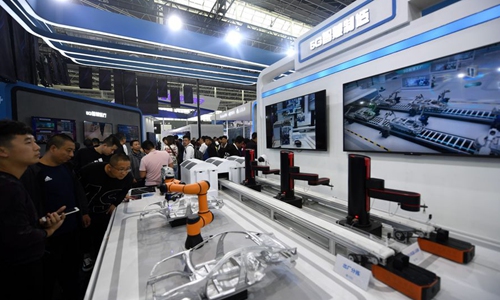Chinese cities lay plans for digital economy, experts urge careful planning
Policies should have precise direction to avoid blind expansion: experts

People visit the China International Digital Economy Expo (CIDEE) in Shijiazhuang, north China's Hebei Province, Oct. 11, 2019. (Xinhua/Wang Xiao)
In the first week of 2021, several cities in China including Shenzhen and Suzhou released roadmaps for the development of the digital economy and industrial digitalization, aiming to promote engagement between technologies with high-quality economic development.
Experts said that due to the COVID-19 epidemic, the digital economy and industrial digitalization has experienced fast growth in China, and it could have accounted for over 40 percent of China total GDP in 2020.
A couple of Chinese cities ramped up efforts to spur the digital economy's growth in the first weeks of the year. Fuzhou in East China's Fujian Province set a goal of increasing the scale of the digital economy to more than 500 billion yuan ($77.2 billion) in 2021 and increasing the proportion of the digital economy in GDP to more than 50 percent in the 14th Five-Year Plan period (2021-25).
Suzhou, East China's Jiangsu Province has announced plans to work with Tencent to build four digital economic centers to drive high-quality development. The city aims to increase the added value of the core industries of the digital economy to 600 billion yuan by 2023, with cumulative invention patents in the field reaching 7,000.
"The COVID-19 epidemic - coupled with the nation's investment for 5G-led new infrastructure in 2020 - accelerated the development of the digital economy," Zhang Yi, CEO of Guangdong-based iiMedia Research, told the Global Times on Sunday.
Zhang estimated that new technologies and applications that emerged in the epidemic such as remote working, online education and health codes are expected to take the size of China's digital economy to more than 40 percent of GDP in 2020 compared with 36.2 percent in 2019.
According to a study on the global digital economy by the China Academy of Information and Communications Technology, the digital economy accounted for 41.5 percent of global GDP in 2019, 1.2 points higher than in 2018. The digital economy contributed 51.3 percent of GDP in developed countries but only 26.8 percent in developing countries.
In 2019, the digital economy accounted for 36.2 percent of China's total GDP, higher than the average level of developing countries, but there is still much room to catch up with Germany or the US, whose digital economies accounted for more than 60 percent, according to the study. Cities in China need to make plans in accordance with their own advantages to avoid rushed expansion.
According to the study, digital economy penetration rates in China's agriculture, industry and service sectors stood at 8.2 percent, 19.5 percent and 37.8 percent respectively in 2019, while the world's average rates in the three sectors were 7.5 percent, 23.5 percent and 39.4 percent.
Tian Yun, vice director of the Beijing Economic Operation Association, said that developing the digital economy could be a breakthrough for economic development amid the pandemic, which has become a trend in China, and the nation has already made great achievements in the service sector.
"The nation could give priority to digital economy development in areas where it has already made evident progress such as the services sector, and use its advantages such as big data that were generated from its tremendous consumer base to facilitate the overall plan," Tian told the Global Times on Sunday, adding that for the agriculture and industry sectors, China should concentrate more on building the foundation of digitalization - the nation's self-developed software and hardware.
In the past 20 years, China has laid a solid foundation for the development and takeoff of the digital economy. In the next stage, effort should be made to determine the precise direction of the concrete fields of the digital economy so as to avoid rushed expansion, Zhang said.
"The decisions should be based on the data and forward-looking judgments, with more investments in basic technology and 5G to avoid being 'strangled' by other countries. Efforts should also be made to improve the fairness of market competition and counter monopolies in order to promote the innovation of the industry," Zhang said.
Tian added that digitalization takes time, and cities should make plans in accordance with their own advantages to avoid blind expansion.
"Digitalization is just a tool to upgrade industries and facilitate economic growth. The digital economy must be built on different cities' local strengths," Tian said.



